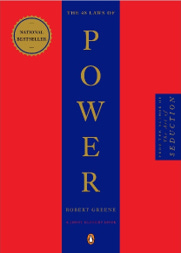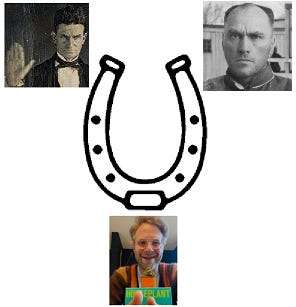There is an awakening when you realize how much of human behavior is driven by unacknowledged motivations. Polite social fictions are peeled back to reveal our basest drives. There is a churning Darwinian world of desire behind the civilized façade of cordiality. However, this insight does not usually translate into any kind of success or rise in the world. The replacement fiction – “I am a clear-eyed realist in dog-eat-dog world” – is just as wrong.
The actual rules of the new game can only be learned by playing it. This is why “red pill” literature about “realist” strategies for getting what we want - typically the goods of sex, status, money and power (SSMP) - is a quick and easy way to fuck your life up. The most successful players tend to be naturals who act on instinct, not by consciously applying scripted techniques.
For most people, being consciously performative is extremely awkward – most of our social performance is as unconscious as breathing, and we often *believe* (or believe that we believe) in the face we show others. Wearing a mask comfortably takes years of practice, and resculpting that mask to something else doesn’t take place overnight.

But if you get past that awkward false awakening and begin to hack social reality, you may succeed in a way that sets you up for failure later on. You will have been playing in cheat mode, treating all social relationships as machines to be hacked rather than living things to be nurtured. A terrible spiritual debt has been incurred, and one way or another, it will have to be paid.
The alternative is playing in hard mode – pursuing our own selfish desires with a sense of integrity that will allow us to make the transition from ambitious chimpanzee to heroic servant at the appropriate time.

Denial
Denial means affirming polite moral fictions that compensate you for not getting what you want. Of course you are concerned with nobler things than getting laid. Of course you don’t care what other people think of you. Of course you have no desire to dominate others.
Renunciation is only possible for those who possess. The Buddha was a prince before he was an ascetic. True pacifists cannot be cowards.
Premature renunciation denies and suppresses fundamental human drives. It leaves people frustrated with life and themselves. This kind of renunciation is born of cowardice: rather than confront the possibility of failure, and what it might say about you, you refuse to try in the first place. By refusing to try, your narrative about yourself (which assures you that you are special and worthy but of course above these sorts of things) can continue unchallenged.
Weakness is always masquerading as virtue. Many people believe they are constrained by morality when they are simply too weak for genuine evil. This is the horseshoe of virtue: saints and the truly wicked are closer to each other than either are to the morally mediocre. Both the wicked and the saintly must step outside the codes of their society and prepare to suffer the consequences.
The Base of Maslow’s Hierarchy
“Base” can mean low and ignoble, but also something that is foundational. Our primary needs move up Maslow’s hierarchy from the concrete to the abstract. At the bottom is physical security – freedom from danger, food, shelter, etc. If you are a reasonably functional individual living in a WEIRD society, chances are most of these are taken care of most of the time. Slightly above these are the “base” desires of SSMP.
The ascent up the hierarchy is not always a linear one. We regard it as a mark of character and nobility when someone can sacrifice at the bottom tier for gains at the top – such as someone who willingly puts themselves in harm’s way to protect their community, or the artist willing to give up material security to pursue their work. But for most of us, the bottom tiers must be worked through until we hit diminishing returns, forcing us to reckon with ourselves and the world at higher and higher levels of abstraction.
Our desires might be ignoble but refusing to pursue them is a mark of cowardice, not a noble renunciation. Once you resolve to pursue your desires there is another danger: they may consume you.
Success Hacking and Easy Mode
Why shouldn’t you optimize for what you want in life, once you have disposed of your moralistic ego defenses?
You can focus single-mindedly on your base desires in a way that leaves you no room for growth when they are exhausted. You can gain the world while losing your soul.
If you are hacking and playing in easy mode, there is a danger you will get exactly what you wanted only to discover that you are a total piece of shit. At this point, you cannot build on your accomplishments seamlessly and begin trying to contribute to the world. You are completely unprepared for the challenges at the upper levels of the hierarchy.
You are on the other side of the valley. The same moral questions that appeared earlier as shields for your weakness reappear in an urgent and substantial form. Creativity also has its own morality: the question of whether you have added value or garbage to the world.
Playing in easy mode will not give you anything substantive on which to build. If your pursuit of SSMP left you as a crummy sex addicted PUA, a purveyor of shitty content, a grifter, or a cynical, self-serving careerist “leader,” you have nowhere to turn when the goods that motivated you no longer satisfy. You only know how to add to the noise and garbage of the world, not how to create value. You’re absolutely fucked and your only hope for redemption is to burn it all down and start over.
Hard Mode – “Become worthy” vs. “Fake it ‘til you make it”
“Hard mode” means that instead of “faking it until you make it” you strive to become worthy. If you pursue your base goals honorably and with a sense of personal integrity you can build smoothly and continuously on your achievements as you ascend. This takes longer. You may watch others race ahead of you. Resist the temptation to take shortcuts and make immediate gains in ways that add no value to the world.
There are many cargo cults of deep, fulfilling and morally laudable work. This is especially true wherever there is an abundance of pro-social focus, such as in activism or charity work. Simplistic, Disneyfied moral narratives create theatres of meaning for the clueless while generating SSMP for the sociopaths.
If you are pursuing SSMP, do not create one of these cargo cults. If you are pursuing meaning, do not be fooled by them. The real red pill is stripping away your illusions about yourself, others, and the world. Adapting your narratives as you encounter reality is necessary to any successful effort to contribute to the world. This disillusionment and adaptation is the cycle of destructive renewal.
What does hard mode look like?
1. Status – being respected for real accomplishments, rather than trying to look good on paper. Avoid the paths of the branded TEDx aspirational class or the carefully groomed Ivy League applicant.
2. Sex – refusing dishonesty, emotional manipulation and exploitation in pursuit of your desires. Treating your sexual relationships as mutual adventures and not conquests.
3. Money – adding value to the world through positive sum arrangements rather than relying on fraud, grift, rent-seeking, or raiding.
4. Power – providing real leadership and exercising power to improve the world around you, rather than seeing power as a good to be held for its own sake. Developing the character to act effectively and decisively in moments of crisis.
Conclusion
Most of my examples are negative – what NOT to do, rather than what to do. Creative approaches to life tend to break new ground. Pursuing SSMP beyond the ordinary ration given out to a “normal” person pursuing a “normal” life entails some kind of deviation from the well trodden path. So too does engaging in the cycle of destructive renewal that comes from being dissatisfied with the world as it is presented to you.
But I believe that there are honorable ways to contribute to the world that do not require you to go off the map into here-be-dragons territory. The advice in this post still applies even if you are risk adverse and unwilling to try and write a new script from scratch. Of course, you can also follow these same well-worn scripts in a way that is lifeless and unsatisfying.
Finally, for those who are wondering – yes, I have tried to make this article itself an example of what I endorse: a lurid, clickbait title intended to increase readership along with substantive, carefully crafted content which I sincerely believe to be true. If you have enjoyed this combination of base status seeking and sober reflection, please share it widely.






Self-deception is the skeleton key to understanding human nature... and this is a deeply counterintuitive Insight, because to figure this out, first you need to realize and identify you have been lying to yourself about some fundamental truths.
Finding your own blind spots is an intense challenge, which usually happens on accident after life punishes you with some kind of unexpected, self-inflicted tragedies.
'Both the wicked and the saintly must step outside the codes of their society and prepare to suffer the consequences.'
This is probably the most powerful insight for me from this essay. Question that I'm curious to know your answer to:
Probably there are a (very select few) who can jump straight to sainthood. For rest of us, do you think we have to learn to out our garbage first before we can learn to stop?
That's been my experience anyway. Don't really know how to stop being wicked until you have been.